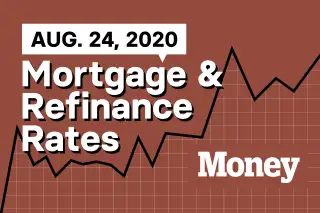Here Are Today's Best Mortgage & Refinance Rates for August 24, 2020

Borrowers with 700 credit scores were quoted an average rate of 3.497% to secure a 30-year fixed-rate purchase mortgage on Friday, according to Money's survey of over 8,000 lenders across the country. At this credit score, roughly the national average, the average rate for a 30-year refinance was 4.568%. Our rates include points and are for borrowers putting 20% down.
| 30-year fixed-rate purchase mortgage |
| 3.497% |
| Rates of August 21, 2020 |
Borrowers in Illinois were quoted the lowest rates on Friday—at 3.324%. Those in Minnesota got the highest average rate at 4.841%. The borrowers with the best credit scores, 740 and above, were quoted rates of 3.107%, while those with credit of 640 or below were given rates of 4.895%—a 1.788 percentage point spread.
You may be able to negotiate a better rate if you shop around or if you have other accounts with the lender. Currently, some banks are hiking up advertised rates to keep demand in check, so you may be offered a lower rate if you reach out directly.
Freddie Mac’s widely quoted Primary Mortgage Market Survey put rates at 2.99% with 0.8 discount points paid for the week ending August 20. The mortgage purchaser’s weekly survey reflects borrowers who put 20% down on conforming loans and have excellent credit.
Refinance rates today
Our survey shows that the best rate for a 30-year refinance for someone with a 740 credit score was 3.773% Friday. Last August, the average mortgage rate (including fees) was 4.005%.
| 30-year fixed-rate mortgage refinance |
| 3.773% |
| Rates of August 21, 2020 |
Refinance Rates for August 21
A homeowner with a $200,000 mortgage balance currently paying 4.005% on a 30-year loan could potentially cut their monthly payment from $1,013 to $929 by financing at today’s lower rates. To determine if now is a good time for you to refinance, you will also want to consider the closing fees you paid on your current mortgage, how much your new lender is charging and how long you have left on your current mortgage. (Our picks for the best lenders for refinancing are here.)
What else is happening in the housing market right now?
The news of today, that could impact your home tomorrow.
Mortgage delinquencies spiked during the second quarter of 2020 according to the Mortgage Bankers Association's National Delinquency Survey, released last week, increasing nearly four percentage points to a seasonally adjusted 8.22% of all outstanding loans.
For survey purposes, the MBA considers loans that haven't made payments according to the original loan terms, even if those loans are in forbearance plans, meaning they are not currently at risk of foreclosure. The 60-day delinquency rate increased to 2.15 %, the highest rate since the beginning of the survey in 1979. The 90-day delinquency rate increased to 3.72% of loans outstanding, the highest level since the third quarter of 2010.
"The COVID-19 pandemic's effect on some homeowners' ability to make their mortgage payments could not be more apparent. The nearly 4 percentage point jump in the delinquency rate was the biggest quarterly rise in the history of the MBA's survey," said Marina Walsh, vice president of industry analysis for the MBA.
Delinquency rate closely tracks with the availability of jobs, as the largest increases in delinquency came from states with large leisure and hospitality industries that were hard-hit by the pandemic, such as New York, New Jersey, Nevada, Florida, and Hawaii.
Despite the sudden rise, there is some slightly positive news: 30-day delinquencies decreased during the second quarter, a possible indication that the number of homeowners in distress may be leveling out as unemployment numbers have started to go down. Walsh believes this spate of delinquencies may not have as severe an impact as in the past.
"Fortunately, there are several mitigating factors that make this current spike in mortgage delinquencies different from the Great Recession," she said. "These factors include home-price gains, several years of home equity accumulation, and the loan deferral and modification options that present alternatives to foreclosure for distressed homeowners."
Mortgage Term of the Week
Understanding the lingo can be key to avoiding mistakes when you are buying a home or refinancing your mortgage.For more read: Everything You Need to Know About Mortgage Rates in 2020
Adjustable-rate mortgage (ARM): a loan where the interest rate changes over time. Most ARMs are fixed at an introductory rate for a period—typically five or seven years— but after that period ends the interest rate will very according to market conditions, typically resetting annually. Starting rates tend to be low on these loans, but you risk a big jump down the line, so an ARM only makes sense if you will move before the fixed-rate period ends.
Bottom line:
Fall Homebuying Outlook: Everything You Need to Know About Prices, Supply and Mortgage Rates